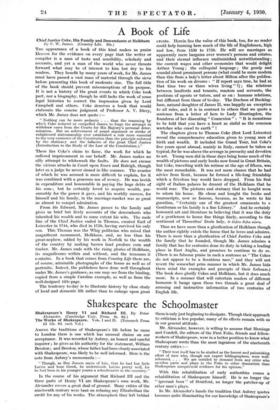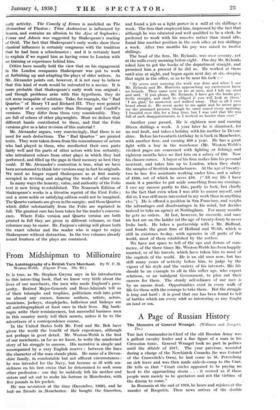Shakespeare the Schoolmaster
Shakespeare's Henry VI and Richard III. By Peter Alexander. (Cambridge Univ. Press. 8s. 6d.)
AMONG the traditions of Shakespeare's life before he came to London there is one which has unusual claims on our acceptance. It was recorded by Aubrey, an honest and careful inquirer ; he gives as his authority for the statement, William Beeston ; and Beeston, whose father had been closely associated with Shakespeare, was likely to be well informed. Here is the note from Aubrey's memoranda :— "Though, as Ben Jonson sayes of him, that he had but little Latine and lease Greek, he understoode Latino pretty well, for he had been in his younger yearee a schoolmaster in the countrey."
In the course of his argument that Richard III and the three parts of ' Henry VI are Shakespeare's own work, Mr. Alexander covers a great deal. of ground. Many critics of the nineteenth century were bent on refusing any Elizabethan the credit for any of his works. The atmosphere they left behind them is only just beginning to dissipate. Though their approach to criticism is less popular, many of its effects remain with us in our general attitude.
Mr. Alexander, however, is willing to assume that Heminge and Condell, the editors of the First Folio, friends and fellow- workers of Shakespeare, were in a better position to know what Shakespeare wrote than the most ingenious of the nineteenth century critics :—
"Their text itself has to be studied as the honest and painstaking effort of men who, though not expert bibliographers, were well- informed. . . . We are entitled to demand from any critic who ascribes parts and plays in the Folio to other dramatists than Shakespeare unequivocal evidence for his opinion."
With this rehabilitation of early authorities comes a rehabilitation of Shakespeare himself. He is no longer the "ignorant boor" of Stratford, no longer the patcher-up of other men's plays.
In Mr. Alexander's hands the tradition that Aubrey quotes becomes quite illuminating for our kmowledge of Shakespeare's
early activity. The Comedy of Errors is modelled on The Menacchmi of Plautus ; Titus Andronicus is influenced by Seneca, and contains an allusion to the Ajax of Sophocles ; Venus and Adonis was suggested by Shakespeare's reading of Ovid. The fact that Shakespeare's early works show these classical influences is certainly congruous with the tradition that he had been a schoolmaster ; and it is certainly hard to explain if we regard him as having come to London with no training or experience behind him.
Critics have usually held the view that on his engagement in the London companies Shakespeare was put to work at furbishing up and adapting the plays of older writers. As Mr. Alexander points out, however, it is not easy to believe that this kind of work would be entrusted to a novice. It is more probable that Shakespeare's early work was original ; and though problems arise with this hypothesis, they do not seem incapable of solution. Take, for example, the "Bad Quartos" of Henry VI and Richard III. They were printed a quarter of a century earlier than Heminge and Condelrs versions. They differ from them very considerably. They are full of echoes of other playwrights. Must we deduce that different hands contributed to them, and that the Folio versions give us a later revision of this material ?
Mr. Alexander argues, very convincingly, that there is no need for such deductions. The "Bad Quartos" are pirated texts. They were taken down from the remembrance of actors who had played in them, who recollected their own parts fairly well and the parts of other actors with less certainty, who introduced echoes from other plays in which they had performed, and fflled up the gaps in their memory as best they could. If Mr. Alexander's contention is true, what we have been accustomed to think later versions may in fact be originals. We need no longer regard Shakespeare as at first mainly occupied in revising and adapting the works of other men.
In many ways the honesty, value, and authority of the Folio text is now being re-established. The Nonesuch Edition of Shakespeare's works is a literatim reprint of the First Folio ; and a more noble or satisfying edition could not be imagined. , The Quarto variants are given in the margin ; and those Quartos which differ substantially from the Folio are reprinted in full. The greatest care has been taken for the reader's conveni- ence. Where Folio version and Quarto version are both printed in full they, are given in different volumes, so that reference may be easier. Mr. Farjeon's editing will please both the exact scholar and the reader who is eager to enjoy Shakespeare without distraction. In the two volumes already issued fourteen of the plays arc contained.











































 Previous page
Previous page